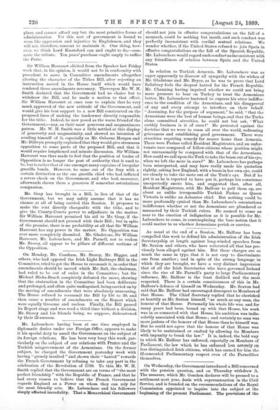As usual at the end of a Session, Mr. Balfour
has been compelled this week to defend his administration of the Irish Secretaryship at length against long-winded speeches from Mr. Sexton and others, who have reiterated all that has pre- viously been alleged against him. But these charges are so much the same in type, that it is not easy to discriminate one from another ; and in spite of the strong language in which they are brought, we have a very distinct impression that of all the Irish Secretaries who have governed Ireland since the rise of Mr. Parnell's party to large Parliamentary influence, Mr. Balfour is the least disliked and the most respected. There is a certain consciousness of this in Mr. Balfour's defence of himself on Wednesday. Mr. Sexton had said that Mr. Balfour had encouraged disrespect to Members of that House. The Chief Secretary replied that he cherished as heartily as Mr. Sexton himself, " as much as any man, the honour of that House. Personally his whole life was, and for many years had been, bound up with that House, his work was in or connected with that House, his ambition was indis- solubly associated with that House ; and certainly no man was more jealous of the honour of that House than he himself was. But he could not agree that the honour of that House was likely to be maintained or exalted by allowing its Members with impunity to break the law." It is, indeed, the bold way in which Mr. Balfour has enforced, especially on Members of Parliament, the law which he has enforced less severely on less distinguished Irish citizens, which has earned for him the ill-concealed Parliamentary respect even of the Parnellites themselves.


































 Previous page
Previous page